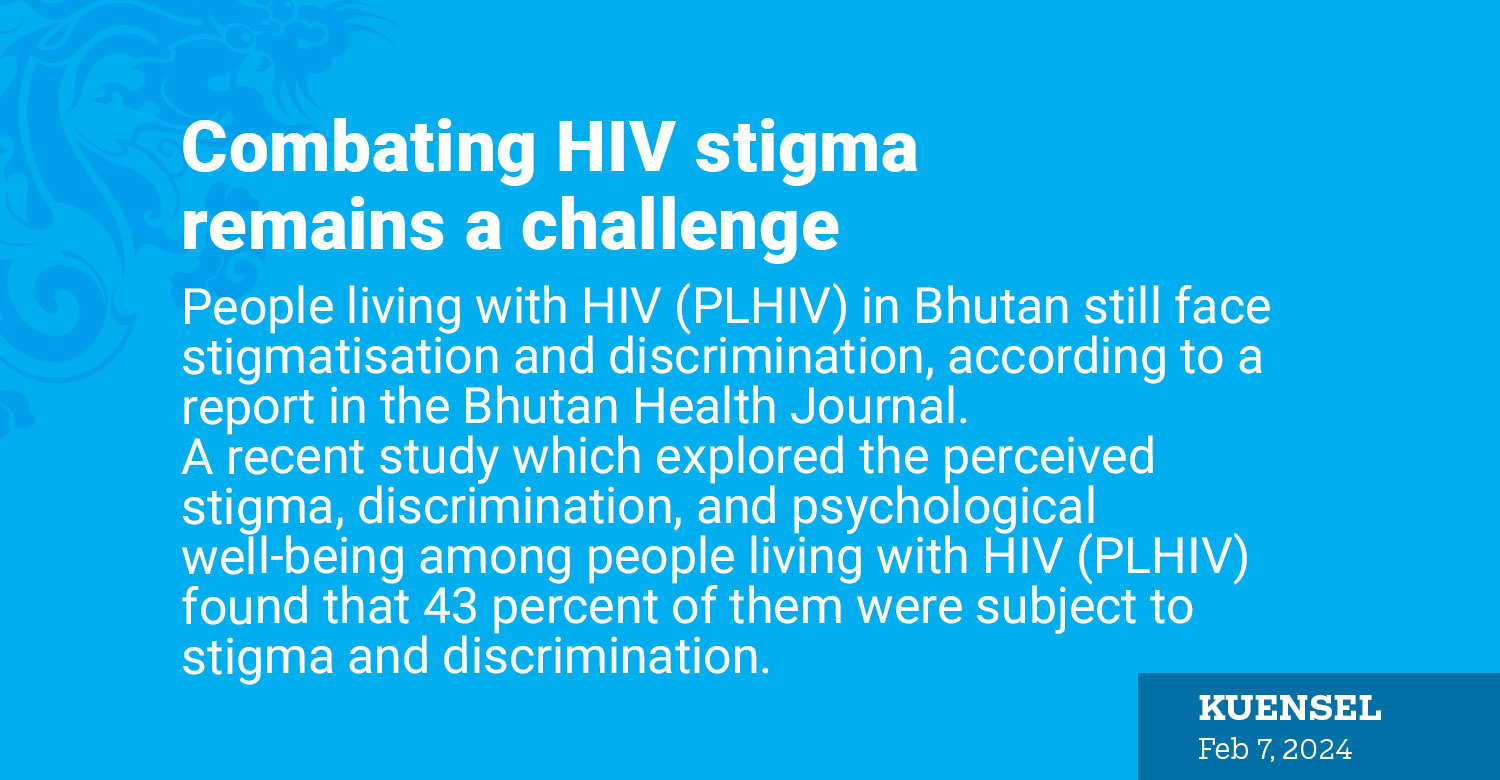Jigmi Wangdi
People living with HIV (PLHIV) in Bhutan still face stigmatisation and discrimination, according to a report in the Bhutan Health Journal.
A recent study which explored the perceived stigma, discrimination, and psychological well-being among people living with HIV (PLHIV) found that 43 percent of them were subject to stigma and discrimination.
Nidup Dorji, Tshering Dukpa, Tshering Wangmo, and Wangchuk from Gesar Gyalpo University of Health Sciences’ public health department and Phuntsho Choden of the Evaluation Association of Bhutan published the report in November 2023.
The report stated that HIV/AIDS is one of the most stigmatised medical conditions and a serious public health challenge in the country.
“HIV-related stigma and discrimination poses greater challenges to PLHIV and remains a major obstacle in curbing the HIV epidemic worldwide,” the report stated.
Despite vigorous advocacy and awareness campaigns, HIV-related stigma and discrimination are still prevalent in Bhutanese society influencing psychological well-being among PLHIV, the report stated.
Since the detection of the first cases of HIV infection in Bhutan in 1993, the collective number of cases as of December 2022 was 874 (456 males and 428 females), mostly (93.8 percent) acquired HIV through the heterosexual route, according to the study.
Since the first reported cases of HIV infection in Bhutan in 1993, the cumulative number of cases stood at 874 by December 2022, with 93.8 percent acquired through heterosexual transmission. The study, which included 28 PLHIV participants, identified community, family members, relatives, and healthcare providers as potential sources of stigma and discrimination.
Participants recounted instances of discrimination from their communities, families, and even healthcare settings. Examples included discriminatory remarks from villagers, warnings to parents about disease status, and job loss due to HIV status disclosure. Such experiences, particularly from family and community members, significantly impact the psychological well-being of PLHIV.
The study identified three key themes that aid PLHIV in coping with stigma and discrimination: introspection, support from family, relatives, and friends, and meditation/mindfulness. Acceptance and support from families and communities are crucial in motivating PLHIV to seek diagnosis and treatment services effectively.
However, fear of HIV transmission and misconceptions among healthcare providers can lead to differential treatment of PLHIV. The study highlights the urgent need for rigorous training to address HIV-related stigma and discrimination among healthcare professionals.
Executive Director of Lhak-Sam, Wangda Dorji acknowledged a decrease in stigmatisation and discrimination against PLHIV compared to the past. “But it is very much prevalent today.”
He said that cultural and religious factors contribute to stigma, with past portrayals of HIV/AIDS as a deadly disease perpetuating fear and misconceptions.
He emphasises the importance of continuous advocacy, highlighting the challenges posed by limited funding. Rigorous campaigns and innovative interventions, including social media and face-to-face interactions, are necessary to combat stigma and discrimination effectively.
The study echoes the need for intensified advocacy efforts, suggesting that traditional methods alone, such as posters and stickers, are insufficient to address critical issues like stigma and discrimination.
The researchers recommend strengthening platforms for discourse on these topics and call on the Ministry of Health to facilitate consultations with relevant stakeholders to develop workplace policies and lobby for anti-discriminatory legislation.


